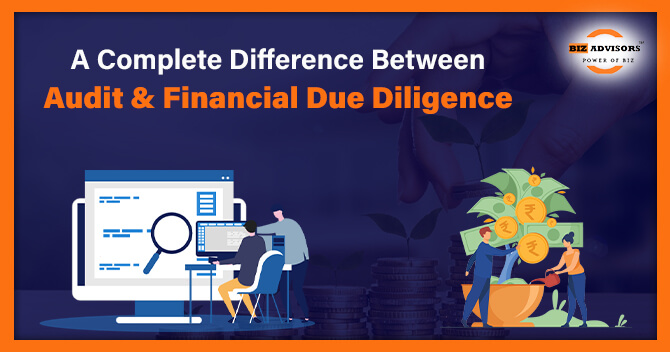The goal of an audit is to confirm that management gave a genuine and fair representation of the financial performance and condition of a company. While Financial Due Diligence will look into a variety of topics, including legal, operational, marketing, IT, and financial issues. In order to clarify the concepts, this article will explore the difference between Audit and Financial Due Diligence.
What is Due Diligence?
The process of verifying all relevant facts, financial data, and any other material that might have been mentioned during an M&A deal or investment process is known as due diligence. It entails looking into or auditing a prospective purchase or investment opportunity. Due diligence is completed before a contract closes to ensure that the buyer is getting what they paid for.
What is Audit?
The term “audit” is typically used in reference to a financial statement audit, which is an impartial study and assessment of a company’s financial statements to ensure that the financial records fairly and accurately reflect the activities that the company claims they represent. The audit may be carried out internally by company staff or outside.
Advantages of Audit
Trustworthiness and Credibility
Your company may produce accurate and trustworthy financial reports using an internal auditing system, giving you valuable information about which product lines or market segments are performing the best and how to allocate resources effectively. Additionally, regular auditing can instill confidence among your shareholders that your financial statements are accurate and reliable and that it is safe to invest in your company.
Stopping Fraud
You’ll probably have to face significant fines and legal repercussions if the government analyses your financial accounts and discovers that your company has been hiding sales and losses or distorting its financial health. Additionally, your company will develop a negative reputation, and stakeholders and customers will likely no longer trust you.
Regular internal audits conducted by a company’s expert auditor or accountant are crucial in spotting these fraud incidents before they get serious and problematic. Simply having a thorough auditing system in place deters and frightens employees and vendors from trying to cheat your company in the first place.
Advantages of Financial Due Diligence
The following are the advantages of Financial Due Diligence:
· Identify any threats that may be associated with the target company.
· Determine whether the transaction is profitable.
· Appreciate the true value of the target company.
· Select the issues that must be resolved before a purchase agreement is finalized.
· Make sure the buyer has the means to complete the transaction.
· Reduce the price of purchases.
· Lower legal expenses.
Types of Audits
Internal Audits
A competent auditor or accountant who works for your organisation conducts an internal audit. This audit ensures that your company is operating legally and that financial data is being recorded truthfully. By doing these internal audits on a regular basis, you can control risk and protect yourself from potential problems like fraud, waste, and financial abuse.
ExternalAudits
An external audit is a review of your financial statements conducted by an impartial expert from a different field. These audits are more objective and trustworthy than internal audits, so they can be quite beneficial.
Types of Financial Due Diligence
Due Diligence from the buyer’s side
This type of FDD will be completed by an acquirer or buyer who plans to buy the target business in the issue. A family office, an investment bank, a sovereign wealth fund, a venture capitalist, a strategic investor, a pension fund, an insurance company, etc. are all examples of potential buyers. The buy-side FDD’s main concern is the target company’s financial stability. Data about the company’s revenue, expenses, cash flow, balance sheet, debtors, and creditors, as well as its profitability, growth rate, market share, and other aspects, must be gathered. A buyer that is interested in buying an existing firm or beginning a new one would perform buy-side financial due diligence to gain a complete understanding of the target’s financial status.
Financial Due Diligence from the seller side(vendor)
Sell-side A seller or vendor selling a business, on the other hand, completes an FDD. This strategy focuses on areas of interest for potential acquirers or buyers to avoid snags in the acquisition.
monetary sell-side Due Diligence supports the seller in identifying issues that would have gone unreported otherwise through an internal audit. A sell-side financial DD must do the same duties; it is just done in a different way.
Difference between Audit and Financial Due Diligence
The following is the difference between Audit and Financial Due Diligence:
1. First of all, an Audit is mostly an internal review. Companies frequently carry out audits[1] to assess their financial state and health. An internal team may occasionally conduct the audit by reviewing its business’s financial statements to ensure that they are accurate and comprehensive. However, some businesses use an outside team to audit their financial statements and assess their veracity.
2. In contrast, Financial Due Diligence is always carried out by an outside party, which means a team of experts reviews and scrutinizes all financial paperwork. The team’s preference is to examine and comprehend a company’s assets, sales, earnings, revenue, profit, debt, and other factors.
3. The Audit usually focuses on past performance and makes sure that the balance sheet, financial statement, and other pertinent papers accurately represent the information and records that are on the financial record.
4. Contrarily, Financial Due Diligence typically entails an examination of the following areas: historical financial results, current financial position, forecast financial results, working capital requirements, employee entitlements provisions, valuation implications, risks and opportunities, and taxation implications.
5. Last but not least, an Audit is primarily concerned with the inspection and verification of the accounting data and is not merely focused on a company’s financial statements.
6. Of course, Due Diligence frequently includes a thorough review of a company’s legal, accounting, tax, operational, and property matters in addition to its financial situation.
Conclusion
The distinctions between Audit and Financial Due Diligence are obvious in the blog. Despite certain similarities, they are different. In order to clear up any confusion about the two ideas, it is crucial to grasp their differences. Seek professional advice to know more about Audit and Financial Due Diligence. You can also reach at Bizadvisors.io for more information.
Read our article:All You Need to Know About Financial Due Diligence
 9559179325
9559179325 9559179325
9559179325





